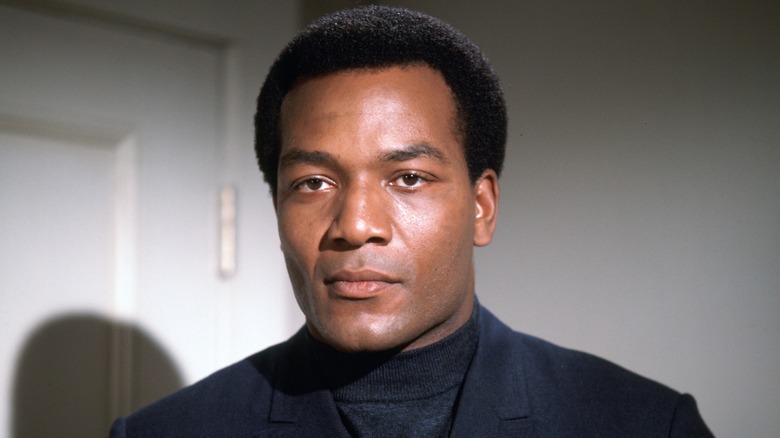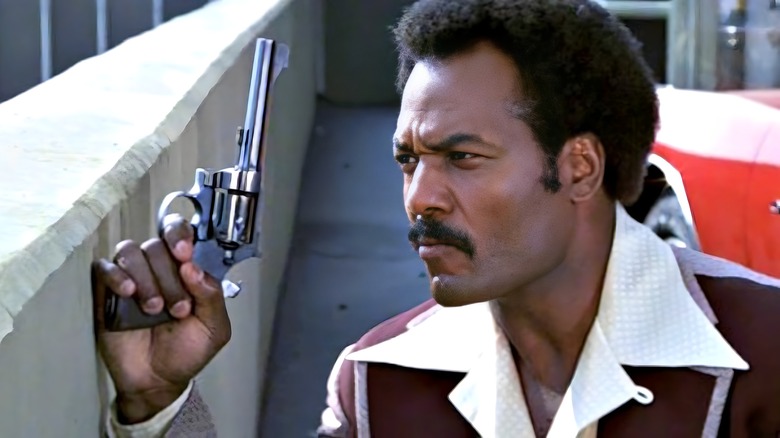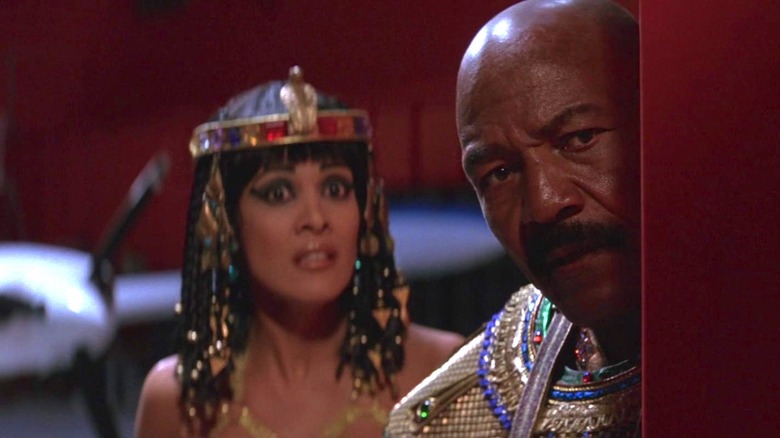Jim Brown Was A Trailblazing Actor And Athlete — And Deeply Complicated Human Being
Jim Brown was everything. He was the greatest football player of all time, a trailblazing Black movie star, a vital voice during the Civil Rights Movement, and a man around whom controversy persistently swirled because he did not give a single, solitary f**k ... to a fault.
Brown was a model of American manhood. He played nine seasons of football as the Cleveland Browns running back, and he made the Pro Bowl in every one. Brown averaged 5.2 yards per carry for his career (third-best of all-time) and did so by scrapping for every inch inbounds. He blasted into defenders with rib-cracking velocity. He took his lumps (which were bruisingly visible in his later years), but when you tackled Brown you got the worst of it. The man didn't believe in running to the sideline. He ran through you.
Brown was also a model of defiance at a time when Black athletes were expected to be grateful for their opportunity to play in what used to be a white man's league. He aligned with outspoken stars like Muhammad Ali, Bill Russell, and Kareem Abdul-Jabbar to protest the boxer's banishment from the sport due to his refusal to fight in Vietnam. They were heroes of conscience to kids all over the country.
Most importantly to his bottom line, Brown was a handsome man with the kind of gruff charm that compared favorably to the likes of Lee Marvin, Clint Eastwood, and Steve McQueen. Movie stardom beckoned, and when the Browns' owner Art Modell threatened to fine the 29-year-old Brown for his absence from training camp while the star running back was finishing his work on "The Dirty Dozen," Brown retired.
Unbowed and spiritually unbroken, and freed from his gridiron obligations, Brown hit Hollywood like it was a quaking, undersized linebacker.
A movie star on his own uncompromising terms
Unlike fellow pro-football player-turned-actor Fred Williamson, Brown was not overly precious about his film work. He understood his power and purpose in movies, which is why he allowed himself to get gunned down running to safety in Robert Aldrich's "The Dirty Dozen" (a moment beautifully memorialized by Tom Hanks in "Sleepless in Seattle"). He's also killed in Jack Cardiff's superb "Dark of the Sun," and, having read Brown's autobiography "Out of Bounds," this evidently didn't bother him.
Still, Brown wasn't exactly an auteur. He hurled himself into the Blaxploitation craze of the 1970s, and co-starred alongside Williamson and Jim Kelly in the wonderfully silly "Three the Hard Way." He scandalized the nation by sharing an interracial smooch with Raquel Welch in Tom Gries' otherwise tepid "100 Rifles," and should've had a long-running franchise with the aggrieved Vietnam veteran he portrayed in "Slaughter" and "Slaughter's Big Rip-Off."
Brown's movie career, which tailed off in the 1980s (though he was splendid as the bunion-afflicted Slammer in Keenan Ivory Wayans' "I'm Gonna Git You Sucka"), and just about everything he did going forward, was about Black economic empowerment. He was singularly focused on this issue, to the extent that he took an ill-advised meeting with President Donald Trump and Kanye West in 2018. He believed his people could excel in business via the same forward-driving grit he displayed on the football field, and preached this gospel until the day he died: May 19, 2023.
Brown lived life like he played football, for better and worse
Brown's recalcitrance had its drawbacks. He was dogged by a series of domestic violence accusations, which included, allegedly, throwing model Eva Bohn-Chin off his house's second-floor balcony. That Brown admitted "[T]he toughest thing I did to Eva was slap her" was frigid comfort.
There were multiple charges of assault, but Brown only did real jail time (three months) for taking a shovel to his wife's car in 1999. I refuse to excuse his violence, but it's clear that violence was integral to his success. He broke men on the football field and portrayed bruisers on the big screen. He was barely ambulatory for the last decade or so of his life.
But he also broke many boundaries and continued to exemplify financial independence for professional athletes. In recent years, prior to a tilt against the Golden State Warriors, the Cleveland Cavaliers LeBron James bowed to Brown. He gently returned the gesture. I found this amusing because when James played high-school football, he was only allowed to run sideline routes because any kind of contact might derail his looming, lucrative basketball career. Brown surely knew this. I can't imagine he approved.
But James is the living, breathing embodiment of what Brown championed. And at the age of 38, James is battling for his fifth NBA Championship while pursuing a lucrative entertainment career. Brown fought for this. Perhaps he fought too hard and too bitterly. But he created opportunities that did not previously exist, and for this, he must be lauded.
It took the Grim Reaper to bring Jim Brown down, and I bet that scythe-wielding bastard is hating life right now.


